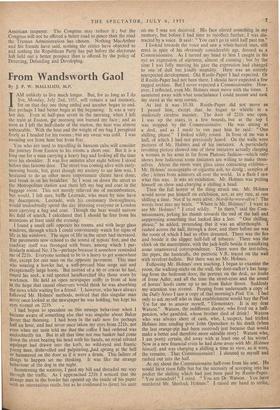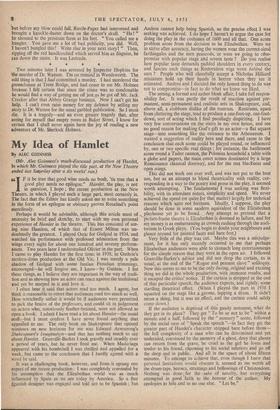From Wandsworth Gaol
By J. P. W. MALLALIEU, M.P.
IAM unlikely to live much longer. But, for as long as I do live, Monday, July 2nd, 1951, will remain a sad memory, for on that day one thing ended and another began to end. But perhaps I had better begin at the beginning. It was a very hot day. Even at half-past seven in the morning, when I left the train at Euston,tlie morning sun burned my face ; and as soon as I left the half-shade of the station, the heat was almost unbearable. With the heat and the weight of my bag I perspired freely as I headed for his rooms ; but my sweat was cold. I was sweating not from heat but from fear.
You who are used to travelling in hansom cabs will consider the journey from Euston to his rooms a short one. But it is a long one for a man carrying ,a heavy bag and looking all the time over his shoulder. It was five minutes after eight before I stood before that famous door. The street was coming alive with early- morning bustle, but, great though my anxiety to see him was, I hesitated to do as other more importunate clients have done, and break in on his breakfast.' So I went on down the street to the Metropolitan station and there left my bag and coat in the baggage room. This not merely relieved me of encumbrances, but would, I felt sure, baffle L,estrade, who must by now have my description. Lestrade, with his customary thoroughness, would undoubtedly spend the day arresting everyone in London seen carrying a bag and coat. Though the heat would narrow his field of search, I calculated that I should be free from his attentions at least until the evening.
I found a small café opposite his rooms, and with large glass windows, through which I could conveniently watch for signs of life in his windows: The signs of life in the street had increased. The pavements now echoed to the sound of typists' feet, and the roadway itself was thronged with buses, among which I par- ticularly noticed No. 13a—perhaps because it somehow reminded me of 221b. Everyone seemed to be in a hurry to get somewhere else, except for one man on the opposite pavement. This man Was wearing a bowler hat, a well-pressed blue serge suit and exceptionally large boots. But instead of a tie Or cravat he had, . round his neck, a red spotted handkerchief like those worn by workmen. He held an open newspaper stiffly in front of him in the hope that casual observers would think he was absorbing the news while waiting for a friend. I, however, who have always followed Mr. Holmes' methods, noticed that this singular man never once looked at the newspaper he was holding, but kept his eyes riveted on 22 lb.
I had begun to speculate on this strange behaviour when I became aware of something else that was singular about Baker Street that morning. I had been in the café now for perhaps half an hour, and had never once taken my eyes from 221b, not even when my taste told me that the coffee I had ordered was undoubtedly tea. But in all that time not one banker had come down the street beating his head with his hands, no royal crested equipage had drawn into the kerb, no wild-eyed and frantic young man, dishevelled and palpitating, ,had sprung at the bell or hammered on the door as if it were a drum. This failure of things to happen set me thinking. It was like the strange behaviour of the dog in the night. Summoning the waitress, I paid My bill and threaded my way through the traffic. As I approached 221b I noticed that the strange man in the bowler hat opened up the inside of his paper with an ostentatious rustle, but as he continued to 'direct his gaze on me I was not deceived. His face stirred something in my memory, but before I had time to recollect further, I was dis- tracted by a voice. It said: " You can't go in until half past ten."
I looked towards the voice and saw a white-haired man, still erect in spite of his obviously considerable age, dressed as a Commissionaire. , As I turned my head to him I caught in his eye an expression of alertness, almost of cunning ; but by the time I was fully meeting his gaze the expression had changed to one of dull but kindly stupidity. Here was an entirely unexpected development. Old Rustle-Paper I had expected. Or if Rustle-Paper had not been there, I should have expected a few ragged urchins. But I never expected a Commissionaire. How- ever, I reflected, even Mr. Holmes must move with the times. I sauntered away with what nonchalance I could muster and took my stand at the next corner.
At last it was 10.30. Rustle-Paper did not move as I passed him, except that he began to whistle in a studiously careless manner. The door of 221b was open. I was up the stairs in a few bounds, but at the top I was stopped by the Commissionaire. He was sitting at a desk, and as I made to run past him he said: " One shilling, please." I looked wildly round. In front of me was a hall, of which I had not previously heard. On the walls were pictures of Mr. Holmes and of his imitators. A particularly revolting picture showed one of these imitators actually clasping a woman in his arms in far from Platonic fashion—which only shows how ludicrous some imitators are willing to make them- selves. About the room were glass cases containing exhibits— Mr. Holmes' monographs or cigarette ash, no doutit ; samples of clay ; letters from admirers all over the world. In a flash I saw what this was. It was an exhibition. Mr. Holmes was putting himself on show and-charging a shilling a head.
Then the full horror of the thing struck me. Mr. Holmes would never put himself on exhibition, not, at any rate, at one shilling a time. Not if he were alive. Not-if-he-were-alive ! The words beat into my brain. " Where is Mr. Holmes? I want to see Mr. Holmes! " I cried wildly. " In there," said the Com- missionaire, jerking his thumb towards the end of the hall and suppressing something that looked like a leer. " One shilling, please," he added, pretending that it was an afterthought. I rushed across the hall, through a door, and there before me was the room of which I had so often dreamed. There was the fire and beside it the slipper half-full of tobacco. There was the clock on the mantelpiece, with the jack-knife beside it transfixing some unanswered correspondence. There were the test-tubes, the pipes, the handcuffs, the patriotic V.R. traced on the wall with revolver-bullets. But there was no Mr. Holmes.
Following Mr. Holmes' own teaching, I began to examine the room, the walking-sticks on the wall, the deer-stalker's hat hang- ing from the bedroom door, the portrait on the desk, no doubt of Irene Adler, and all the time the street-cries and the sound of horses' hoofs came up to me from Baker Street. Suddenly my attention was riveted. Peeping_ from underneath a copy of the Daily News I saw a copy of that morning's Pink 'Un. I had only to ask myself who in that establishment would buy the Pink 'Un for me to answer myself, " Elementary. It is my deaf Watson." Watson, the indifferent doctoi, who lived on a half- pension, who gambled, whose brother died of drink! Watson who was always short of cash, who, I, suspect, had tricked Holmes into sending poor John Openshaw to his death (when the last orange-pip had been received) just because that would make a better and therefore more saleable story Watson who, I am pretty certain, did away with at least one of his wives! Now in a new financial crisis he had done away with Mr. Holmes himself, and was charging a shilling a time to view, as it were, the remains. That Commissionaire! I shouted to myself and rushed out into the hall.
At my shout the Commissionaire half-rose from his seat. He would have risen fully but for the necessity of scooping into his pocket the shilling which had just been paid by Rustle-Paper. You scoundrel! " I cried. " You are Dr. Watson. You have murdered Mr, Sherlock Holmes." I raised my hand to strike, but before my blow could fall, Rustle-Paper had intervened and brought a knuckle-duster down on the doctor's skull. "Ha! " be shouted to the prostrate form at his feet. " You called me a bungler. You gave me a lot of bad publicity, you did. Well, I haven't bungled this! Write that in your next story! " Then, ripping off the red handkerchief which served him as disguise, he ran down the stairs. • It was Lestrade.
Two minutes later I was arrested by Inspector Hopkins for The murder of Dr. Watson. I'm on remand in Wandsworth. The odd thing is that I had committed a murder. I had murdered the groundsman at Trent Bridge, and had come to see Mr. Holmes because I felt certain that since the crime was so condonable he would find a way of getting me off just as he got off Mr. Jack Crocker after that Abbey Grange business. Now I can't get his help. I can't even raise money for my defence by selling my story to Dr. Watson for the usual garbled publication. So I must die. It is a tragedy—and an even greater tragedy that, after seeing for myself that empty room in Baker Street, I know for certain that I shall never again have the joy of reading a new adventure of Mr. Sherlock Holmes.























































 Previous page
Previous page